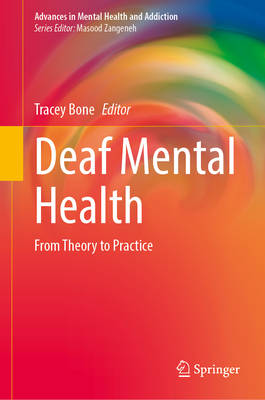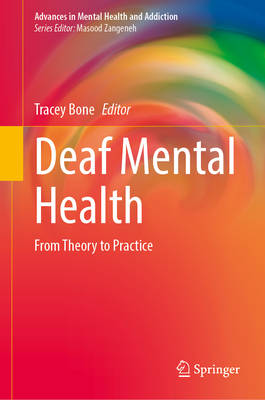
- Retrait gratuit dans votre magasin Club
- 7.000.000 titres dans notre catalogue
- Payer en toute sécurité
- Toujours un magasin près de chez vous
- Retrait gratuit dans votre magasin Club
- 7.000.0000 titres dans notre catalogue
- Payer en toute sécurité
- Toujours un magasin près de chez vous
Deaf Mental Health
From Theory to Practice
274,95 €
+ 549 points
Description
One in four Canadians will experience a mental health problem or mental illness in their lifetime. Research suggests that Deaf Sign Language users have an increased burden of mental health problems for reasons including lack of professional awareness and understanding of this cultural and linguistic minority community, early and adverse childhood communication experiences, and language access barriers to existing mental health services and supports. Titled "Deaf Mental Health; From Theory to Practice" this text assumes a population health approach. Using a human rights and social justice lens, the aim of this text is to inform and educate. It begins by introducing Deaf, Hard of Hearing, and DeafBlind identities and factors that may impact comprehensive mental health assessment and practice. Be the reader a post-secondary student from a professional or allied field, or a practicing professional with little prior experience working with the Deaf community, the chapters in this text will inform and educate on a variety of topic areas. A note to the reader: terminology used to describe members of this heterogeneous community within chapters will vary, based on author preference, and/or their field of study. Authors clarify the terminology used in their chapters to assist the reader. Readers are reminded however, that irrespective of one's professional preference, interactions with clients or members of the Deaf, Hard of Hearing or DeafBlind communities must be conducted with respect for the identity and language preferences of the person in front of you. This text concludes with a proposal for a Deaf Mental Health Strategy that expands Canada's Mental Health Strategy in a way that respectfully meets the needs of Deaf and Hard of Hearing individuals while promoting social inclusion and non-discrimination.
Spécifications
Parties prenantes
- Editeur:
Contenu
- Nombre de pages :
- 199
- Langue:
- Anglais
- Collection :
Caractéristiques
- EAN:
- 9783032062734
- Date de parution :
- 03-12-25
- Format:
- Livre relié
- Format numérique:
- Genaaid
- Dimensions :
- 155 mm x 235 mm

Les avis
Nous publions uniquement les avis qui respectent les conditions requises. Consultez nos conditions pour les avis.





